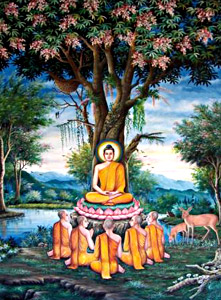 Buddha taught the whole universe the truth of life and directed his disciples to choose the right path to accomplish their spiritual goal. Some scholars believe that some parts of the Pali Canon and the agamas contained the actual substance of the historical teachings and also the original words of Buddha. But Mahayana Sutra did not contain the original teachings of Buddha. The scriptural works of early Buddhism precede the Mahayana works chronologically and they are considered as the main credible source for information of the actual historical teachings of Gautama Buddha.
Buddha taught the whole universe the truth of life and directed his disciples to choose the right path to accomplish their spiritual goal. Some scholars believe that some parts of the Pali Canon and the agamas contained the actual substance of the historical teachings and also the original words of Buddha. But Mahayana Sutra did not contain the original teachings of Buddha. The scriptural works of early Buddhism precede the Mahayana works chronologically and they are considered as the main credible source for information of the actual historical teachings of Gautama Buddha.
Goutama Buddha taught his followers in the following way-
The Four Noble Truths
The noble truths are that the suffering is an inevitable part of life; origin of suffering is ignorance and the main symptoms of that ignorance are attachment and craving; attachment and craving can be ceased; and following the noble eightfold path will lead the cessation of attachment, craving and therefore suffering.
The Noble Eightfold Path
these are right understanding, right speech, right thought, right action, right effort, right livelihood, right mindfulness and right concentration.
Dependent Origination
Any phenomenon exists only because of the existence of other phenomenon in a complex web of cause and effect. This web covers the time including past, present and future. All things in this universe are thus conditioned and transient (anicca) and have no real independent identity (anatta).
Anicca
This is termed as `Anitya` in Sanskrit. It says that nothing is permanent.
Anatta
in Sanskrit, it is termed as `Anatman`. It says that the perception of a constant `self` is nothing but an illusion.
Dukkha
All living beings suffer from all situations due to unclear mind.
However, according to some Mahayana schools, these points are considered as more or less subsidiary. Various schools of Buddhism disagree over more mystic aspects of Buddha`s teachings and also over some of the disciplinary rules for monk.
Buddha gave much emphasis on ethics and correct understanding. He raised the question about the common notions of divinity and salvation. He said that Gods were subjected to Karma themselves, and the Buddha is solely a guide and teacher for the human beings to achieve Nirvana themselves to achieve the spiritual awakening called bodhi and find the truth and reality of the life. The Buddhist system of insight and meditation practice is believed to reveal the understanding of true nature of the mind, that must be discovered by personally treading a spiritual path guided by teachings of Buddha.




















